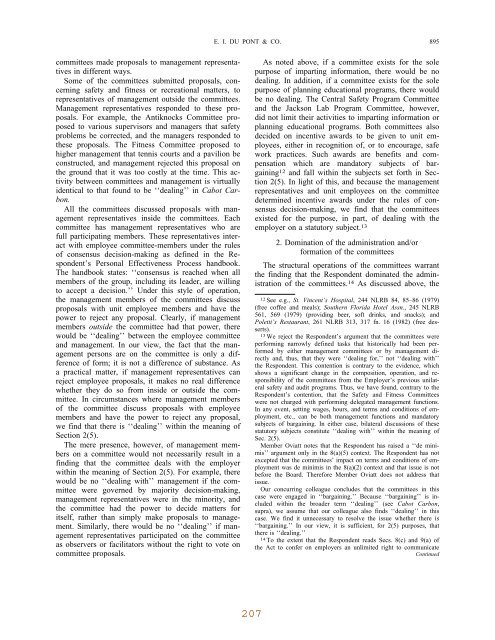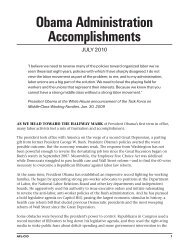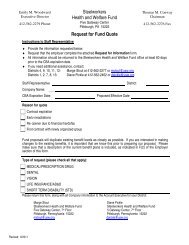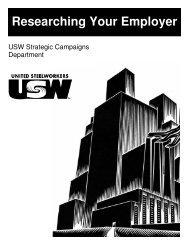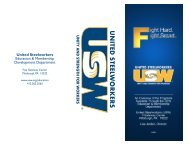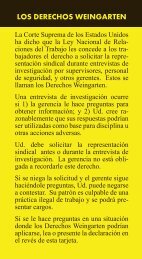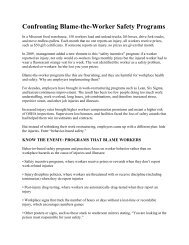Union Approach to Health and Safety: - United Steelworkers
Union Approach to Health and Safety: - United Steelworkers
Union Approach to Health and Safety: - United Steelworkers
You also want an ePaper? Increase the reach of your titles
YUMPU automatically turns print PDFs into web optimized ePapers that Google loves.
E. I. DU PONT & CO.<br />
895<br />
committees made proposals <strong>to</strong> management representatives<br />
in different ways.<br />
Some of the committees submitted proposals, concerning<br />
safety <strong>and</strong> fitness or recreational matters, <strong>to</strong><br />
representatives of management outside the committees.<br />
Management representatives responded <strong>to</strong> these proposals.<br />
For example, the Antiknocks Committee proposed<br />
<strong>to</strong> various supervisors <strong>and</strong> managers that safety<br />
problems be corrected, <strong>and</strong> the managers responded <strong>to</strong><br />
these proposals. The Fitness Committee proposed <strong>to</strong><br />
higher management that tennis courts <strong>and</strong> a pavilion be<br />
constructed, <strong>and</strong> management rejected this proposal on<br />
the ground that it was <strong>to</strong>o costly at the time. This activity<br />
between committees <strong>and</strong> management is virtually<br />
identical <strong>to</strong> that found <strong>to</strong> be ‘‘dealing’’ in Cabot Carbon.<br />
All the committees discussed proposals with management<br />
representatives inside the committees. Each<br />
committee has management representatives who are<br />
full participating members. These representatives interact<br />
with employee committee-members under the rules<br />
of consensus decision-making as defined in the Respondent’s<br />
Personal Effectiveness Process h<strong>and</strong>book.<br />
The h<strong>and</strong>book states: ‘‘consensus is reached when all<br />
members of the group, including its leader, are willing<br />
<strong>to</strong> accept a decision.’’ Under this style of operation,<br />
the management members of the committees discuss<br />
proposals with unit employee members <strong>and</strong> have the<br />
power <strong>to</strong> reject any proposal. Clearly, if management<br />
members outside the committee had that power, there<br />
would be ‘‘dealing’’ between the employee committee<br />
<strong>and</strong> management. In our view, the fact that the management<br />
persons are on the committee is only a difference<br />
of form; it is not a difference of substance. As<br />
a practical matter, if management representatives can<br />
reject employee proposals, it makes no real difference<br />
whether they do so from inside or outside the committee.<br />
In circumstances where management members<br />
of the committee discuss proposals with employee<br />
members <strong>and</strong> have the power <strong>to</strong> reject any proposal,<br />
we find that there is ‘‘dealing’’ within the meaning of<br />
Section 2(5).<br />
The mere presence, however, of management members<br />
on a committee would not necessarily result in a<br />
finding that the committee deals with the employer<br />
within the meaning of Section 2(5). For example, there<br />
would be no ‘‘dealing with’’ management if the committee<br />
were governed by majority decision-making,<br />
management representatives were in the minority, <strong>and</strong><br />
the committee had the power <strong>to</strong> decide matters for<br />
itself, rather than simply make proposals <strong>to</strong> management.<br />
Similarly, there would be no ‘‘dealing’’ if management<br />
representatives participated on the committee<br />
as observers or facilita<strong>to</strong>rs without the right <strong>to</strong> vote on<br />
committee proposals.<br />
As noted above, if a committee exists for the sole<br />
purpose of imparting information, there would be no<br />
dealing. In addition, if a committee exists for the sole<br />
purpose of planning educational programs, there would<br />
be no dealing. The Central <strong>Safety</strong> Program Committee<br />
<strong>and</strong> the Jackson Lab Program Committee, however,<br />
did not limit their activities <strong>to</strong> imparting information or<br />
planning educational programs. Both committees also<br />
decided on incentive awards <strong>to</strong> be given <strong>to</strong> unit employees,<br />
either in recognition of, or <strong>to</strong> encourage, safe<br />
work practices. Such awards are benefits <strong>and</strong> compensation<br />
which are m<strong>and</strong>a<strong>to</strong>ry subjects of bargaining<br />
12 <strong>and</strong> fall within the subjects set forth in Section<br />
2(5). In light of this, <strong>and</strong> because the management<br />
representatives <strong>and</strong> unit employees on the committee<br />
determined incentive awards under the rules of consensus<br />
decision-making, we find that the committees<br />
existed for the purpose, in part, of dealing with the<br />
employer on a statu<strong>to</strong>ry subject. 13<br />
2. Domination of the administration <strong>and</strong>/or<br />
formation of the committees<br />
The structural operations of the committees warrant<br />
the finding that the Respondent dominated the administration<br />
of the committees. 14 As discussed above, the<br />
12 See e.g., St. Vincent’s Hospital, 244 NLRB 84, 85–86 (1979)<br />
(free coffee <strong>and</strong> meals); Southern Florida Hotel Assn., 245 NLRB<br />
561, 569 (1979) (providing beer, soft drinks, <strong>and</strong> snacks); <strong>and</strong><br />
Poletti’s Restaurant, 261 NLRB 313, 317 fn. 16 (1982) (free desserts).<br />
13 We reject the Respondent’s argument that the committees were<br />
performing narrowly defined tasks that his<strong>to</strong>rically had been performed<br />
by either management committees or by management directly<br />
<strong>and</strong>, thus, that they were ‘‘dealing for,’’ not ‘‘dealing with’’<br />
the Respondent. This contention is contrary <strong>to</strong> the evidence, which<br />
shows a significant change in the composition, operation, <strong>and</strong> responsibility<br />
of the committees from the Employer’s previous unilateral<br />
safety <strong>and</strong> audit programs. Thus, we have found, contrary <strong>to</strong> the<br />
Respondent’s contention, that the <strong>Safety</strong> <strong>and</strong> Fitness Committees<br />
were not charged with performing delegated management functions.<br />
In any event, setting wages, hours, <strong>and</strong> terms <strong>and</strong> conditions of employment,<br />
etc., can be both management functions <strong>and</strong> m<strong>and</strong>a<strong>to</strong>ry<br />
subjects of bargaining. In either case, bilateral discussions of these<br />
statu<strong>to</strong>ry subjects constitute ‘‘dealing with’’ within the meaning of<br />
Sec. 2(5).<br />
Member Oviatt notes that the Respondent has raised a ‘‘de minimis’’<br />
argument only in the 8(a)(5) context. The Respondent has not<br />
excepted that the committees’ impact on terms <strong>and</strong> conditions of employment<br />
was de minimis in the 8(a)(2) context <strong>and</strong> that issue is not<br />
before the Board. Therefore Member Oviatt does not address that<br />
issue.<br />
Our concurring colleague concludes that the committees in this<br />
case were engaged in ‘‘bargaining.’’ Because ‘‘bargaining’’ is included<br />
within the broader term ‘‘dealing’’ (see Cabot Carbon,<br />
supra), we assume that our colleague also finds ‘‘dealing’’ in this<br />
case. We find it unnecessary <strong>to</strong> resolve the issue whether there is<br />
‘‘bargaining.’’ In our view, it is sufficient, for 2(5) purposes, that<br />
there is ‘‘dealing.’’<br />
14 To the extent that the Respondent reads Secs. 8(c) <strong>and</strong> 9(a) of<br />
the Act <strong>to</strong> confer on employers an unlimited right <strong>to</strong> communicate<br />
Continued


